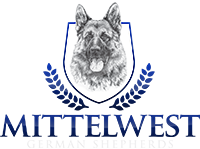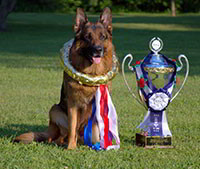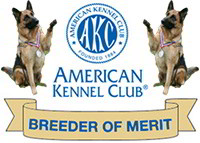TL;DR:
Raising a female German Shepherd puppy involves attentive care in nutrition, training, exercise, grooming, and socialization. Following a structured routine helps ensure a confident, happy, and healthy adult dog.
Bringing home a female German Shepherd puppy is both exciting and challenging. Her sharp mind, high energy, and affectionate nature make her a beloved, if sometimes overwhelming, family member.
To help her thrive, you’ll need a thoughtful approach to care that addresses her physical growth, mental stimulation, and emotional stability. The following tips will walk you through the essentials.

Familiarizing With A Female German Shepherd Puppy
Before diving into routines, you understand what makes female German Shepherds tick. Their instincts, temperament, and biological development set the tone for how you’ll raise them.
Traits To Expect
- Intelligence: Female GSDs are quick learners and often enjoy challenges.
- Loyalty: They form a deep bond with their family and may become protective.
- Maturity: Females typically mature faster than males.
- Sensitivity: Hormonal shifts during heat cycles may affect mood or energy.
What To Prepare For
- Fluctuating behavior around heat cycles.
- A desire to please, but also independence.
- Strong attachment can lead to separation anxiety.
Knowing your puppy’s baseline behavior will guide how you respond to her needs. Let’s start with nutrition—the cornerstone of a healthy pup.
Nutrition: Building A Strong Foundation
Feeding your puppy well from day one affects her long-term health and development. Her food should support muscle growth, brain function, and a shiny coat.
What To Feed
- High-quality puppy food with meat as the primary ingredient.
- 22–32% protein for optimal growth and muscle development.
- Omega-3s and DHA for brain and joint health.
- Calcium and phosphorus for bones and teeth.
Feeding Tips
- Feed 3-4 meals daily until 6 months old, then reduce to 2 meals per day.
- Keep a strict feeding schedule to manage energy and digestion.
- Don’t offer human snacks; they throw off balance and promote bad habits.
With a proper diet in place, you’ll be ready to support her active lifestyle with age-appropriate exercise. Let’s get her moving next.
Exercise: Channeling Energy Positively
Your female German Shepherd’s boundless energy can become a strength or a struggle. The key lies in structured, low-impact activities that fit her age and physical development.
Types Of Exercise
- Short walks (10–20 minutes twice daily).
- Play sessions: Fetch, tug-of-war, or gentle chase games.
- Puppy agility: Tunnels, ramps, and soft obstacles.
What To Avoid
- Excessive running or jumping can be detrimental to young joints.
- Overexertion, especially during warm weather.
- High-impact fetch games with stairs or hard landings.
Balancing play and rest helps your puppy avoid injuries and stay emotionally centered. As the puppy grows stronger, you can begin shaping behavior with early training techniques.
Training: Establishing Good Behavior Early
Training builds trust and communication. Female German Shepherds tend to respond quickly to structure, especially when sessions are consistent, short, and reward-based.
Foundational Commands
- Sit: Instructs your puppy to lower her rear to the ground and remain still until released.
- Stay: Tells your puppy to hold her current position without moving until given another cue.
- Come: Calls your puppy to return to you immediately, no matter what she’s doing.
- Leave It: Directs your puppy to stop focusing on or drop whatever she’s sniffing, chewing, or eyeing.
- Crate. Sends your puppy into her crate or designated resting space calmly and willingly.
How To Train
- Use positive reinforcement (treats, toys, praise).
- Keep sessions short: 5–10 minutes max.
- Practice in quiet, distraction-free spaces.
- Repeat daily to solidify habits.
Once your pup has mastered basic commands and routines, consistent health care becomes the next priority. It’s time to examine preventive steps that will keep the female GSD puppy thriving in the long term.
Health Care: Preventive Measures For Longevity
Veterinary care ensures your puppy develops properly and stays safe from common illnesses. Timely vaccinations and routine screenings help you catch potential issues before they become serious.
Health Priorities
- Vaccinations: Start at 6–8 weeks; follow up as scheduled.
- Parasite control: Monthly treatments for fleas, ticks, and worms.
- Spaying: Typically between 6 and 12 months (consult your vet).
- Microchipping: For safety and identification.
Monitoring Health
- Watch for changes in appetite, energy, or stools.
- Keep a health journal to track vaccines, vet visits, and symptoms.
- Schedule annual checkups after the first year.
When your puppy feels physically well, she can fully enjoy grooming time and stay more comfortable in her skin. That leads us to her coat and hygiene needs.
Grooming: Maintaining A Healthy Coat
Keeping your puppy’s coat clean and brushed reduces shedding and discomfort. It also builds trust and creates moments of calm during otherwise busy days.
Grooming Basics
- Brush 2–3 times a week (daily during the shedding season).
- Use a de-shedding brush for undercoat maintenance.
- Bathe once every 2–3 months or when dirty.
- Trim nails monthly to avoid overgrowth and pain.
Hygiene Checks
- Clean ears weekly with a vet-approved solution.
- Brush teeth 2–3 times a week to prevent dental issues.
- Wipe paws after walks to remove dirt and irritants.
Good grooming habits make her more comfortable around people, especially during vet visits or social outings. Now, let’s address the everyday struggles that most owners face.
Addressing Common Challenges
Chewing, house training, and anxious behavior are all common behaviors. Instead of reacting with frustration, approach each hurdle as a learning opportunity for both of you.
Common Issues & Fixes
- Chewing: Give safe chew toys. Rotate them for novelty.
- Potty training: Take her out after meals and naps. Praise instantly.
- Shyness: Expose her gently to new faces, places, and sounds.
- Excessive barking: Redirect with commands and positive alternatives.
Consistency Is Key
- Stick to a daily schedule.
- Reward desired behavior immediately.
- Ignore attention-seeking antics; praise calmness.
Resolving these early issues helps prevent future stress and confusion. Once basics are under control, you can sharpen your pup’s mental edge with engaging play and stimulation.
Mental Stimulation: Keeping Her Mind Sharp
Intelligent dogs get bored fast. Without mental stimulation, your pup may resort to destructive behaviors. Toys, games, and puzzles are excellent tools to keep the puppy entertained and engaged in learning.
Enrichment Ideas
- Puzzle feeders for meals.
- Hide-and-seek with treats.
- Name toys and encourage toy retrieval.
- Teach tricks beyond basic commands, such as shake, rollover, or balance.
Rotate & Refresh
- Switch out toys weekly.
- Introduce new tasks or scents regularly.
- Let her solve problems without interference.
Regular mental stimulation adds structure and fun to daily routines. To truly support growth, ensure the puppy’s environment feels like home.
Creating A Safe & Comfortable Environment
A safe space helps reduce stress and boost confidence. Puppies benefit from calm surroundings with clear boundaries, whether it’s a crate, a bed, or a designated play area.
Home Setup
- Select a quiet crate location near family activities, but avoid placing your pup in a chaotic area.
- Provide a cozy bed, toys, and water nearby.
- Puppy-proof: Hide wires, secure trash, and remove small, easily accessible items.
Routine Helps
- Create predictable meal, play, and sleep times.
- Reward calm behavior inside the home.
- Use soft music or white noise for anxious pups.
Consistency and comfort build emotional security. Now that your puppy feels at home, it’s time to focus on strengthening your bond with her.
Building A Strong Bond With Your Female GSD
Trust grows from regular, positive interaction. Whether through play, grooming, or training, every moment you spend together shapes your relationship.
Daily Connection Tips
- One-on-one playtime builds joy and trust.
- Speak clearly and kindly; your tone matters more than words.
- Let her follow you around while you do chores.
Respect Her Space
- Recognize signs of stress or overexcitement.
- Give her a safe retreat when she needs to calm down.
A deep bond fosters smoother communication and happier behavior. When it comes to support, no one understands this better than the team at Mittelwest.
Mittelwest Provides Lifetime Support
Mittelwest isn’t just about breeding; it’s about raising better dogs. We provide advice, resources, and hands-on support for every stage of your puppy’s life.
Why Mittelwest?
 Decades of experience with German Shepherds.
Decades of experience with German Shepherds.- Access to veterinary and behavior advice.
- Training consultations tailored to your pup.
- Ongoing support long after pickup.
Our Promise
- Every puppy receives health screenings and early socialization.
- We match families with dogs that suit their lifestyle.
- We’re here to support the journey from day one to adulthood.
Whether you’re looking for training assistance, nutrition tips, or emotional guidance, Mittelwest is a trusted partner. We’re here to help your puppy reach her full potential.
Caring for a female German Shepherd puppy involves more than just love—it requires structure, observation, and a daily commitment to her well-being. The habits you build now last a lifetime.
Your dedication sets the tone for her future. By nurturing her mind and body today, you’re creating a bond and a legacy that’ll reward you with loyalty and love for years to come. Mittelwest is with you every step.













